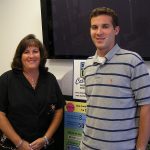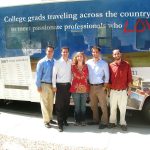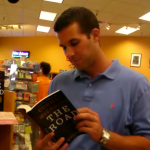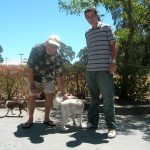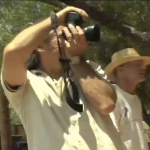Interview: How To Become a Wildlife Expert
At 22? At 22 I didn’t have a clue. Honestly. I had gone to Silvermine College in Connecticut and then left college early to go to Aspen and do some skiing. Just before I went back to college I was drafted. I ended up going to Vietnam. I was there for nine months and got an early out. And was in California at that age wondering what I was going to do.
I did a multitude of jobs from working for an oil company to doing seismic testing to being a roustabout to teaching sailing. Finally, I needed to settle down. The money wasn’t there and I was getting a little older and getting more focused on the future. Because I had fallen in love (Laughs). One of the things you need to bring to the table is how you support.
I did a bunch of interviews for sales jobs. I was hired by a company called Financial Coordinators. What they do is they train and license you. They offered me an amazing salary for that time. A company car, which was a big deal. A nice expense account and a lot of security. I went back to my third and fourth interview and I looked at my new office and met the people working there, all a little bit older than me, and thought that I had tremendous opportunity.
Two days later, I friend of mine was being interviewed at this place called Africa USA. They raise wild animals there. I went along with him, and while he was being interviewed, I was looking around at people bottle feeding lion cubs and tiger cubs. I saw a fella walking a zebra on a leash. I saw a giraffe go by. I thought this is amazing!
So I went to interview for the job myself, just for the fun of it. Well, they called me the next day and offered me the job, and not him. But we’re still friends (laughs).
I talked to this fella for hours and hours. If I can step backwards a few years, as a child, my grandfather was a forester. My childhood playground was 3600 acres of trees and wildlife. My entire childhood was in wildlife, and in wild places.
It just clicked. The fact that I could be around animals again was called affection training. It was the new type of training, where instead of the whips and guns and chairs, they bottle feed animals using positive reinforcement. The animals associate people with warm bottles of milk and food and affection, and thus you build trust. So they’re very calm in captivity and they reproduce well.
The night of my welcome aboard party at Financial Coordinators, I’ll never forget, I called them and said, ‘I decided I’m not going to be taking your job.’ They were a little angry and said, ‘Why not! Is it another company? Have they offered you more? We’ll meet their offer!’ I said, ‘Actually no. They’ve offered me less. I’m going to make less money and work more hours. But it’s a job I think I’m going to love.’ I told them what I was doing and they said it was best that I wasn’t working for them.
So for a year I went to schools there, learning this affection training. Working with lions and tigers and bears and all these young animals that needed help. Their mothers wouldn’t take care of them in lieu of pay.
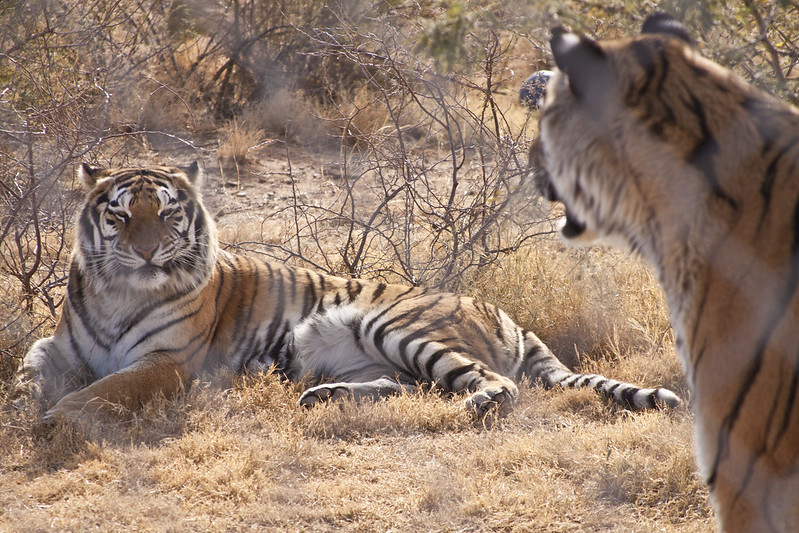
The second year I was doing it, and by this time I was married. My wife was teaching kindergarten. And I was doubting that this was something that was going to support me even though I loved it. My wife has always been so supportive. She said, ‘If you’re that passionate about and you think it’s going to work and you see that it has a future down the road, don’t give up.’
So I worked another entire year and just as I was about to graduate, the company went bankrupt. So I backed off and basically had wasted two years doing something I loved, but financially it didn’t help me much. Another company bought our company out. A friend called me up and asked if I would come back and work for them to train some people with what I’d been taught in hand raising animals.
So I did. It was great. We developed that park. We moved to a small place called Buellton. There I developed education programs with hand raised animals. There were Siberian tigers, adult lions. We would have people come sit before us. We were miked. We’d bring out the animals that had been bottle raised and taught them about conservation issues.
That went over well. It was a little promotion. Then I moved to Redwood City to a failing theme park called Marine World. We added all of our African animals to the them park and the attendance went up 36%. It was pretty radical in those days because we didn’t cage the animals. We caged the people. We bought forty man Colorado River rafts, put the people in the rafts, and turned the animals all loose on islands. It was a pretty big deal. It worked. The animals started producing well and were happy with their space to run. The people liked the boat ride. While they were on the boat ride they were given educational material about the animals. That worked for quite a while.
We ran that park for ten years. One of our tigers had seven babies born. They usually have two to three. We were able to get in the den box and rotate them all so that they got the necessary colostrum. A photo was taken and it went on the wire. This was a crucial time because six weeks later I took them to the Johnny Carson show to show the world’s largest liter of tiger cubs.
In those days, all spotted and stripped cats were endangered species. This was a big deal. Who’s there but Jim Fawler from Mutual of Omaha’s Wild Kingdom. I’ll never forget it. He said, ‘Do you know Mr. Perkins is ill right now? Would you be interested in joining us on the show?’
I said, ‘Gee. I have this wonderful corporate job I’ve been working on. I don’t have that many more years. And, uh…I would love to.’
I flew home and had a family meeting. I had a young family at the time. Once again, my wife stepped up to the plate. She said that this was a great opportunity, and that I might want to talk to them a bit more.
I went back to Omaha to talk and they said they’d be making six shows a year. I flew back to my other company and said, ‘I found a way to get this park national exposure.’ So for the next several years I did both. I worked for Mutual of Omaha filming their shows, came home, and worked at Marine World. As this job evolved, I was doing more and more office work. I was dealing with more people issues, more budget issues, spending less and less time with the animals.
So at that time, was another time in my career to focus all the attention on the filming for Mutual of Omaha and phase out of the office. Because obviously, I was getting less and less productive at that. And I’m not that comfortable spending that many hours inside.
That went on from ’85 until present day. Filming in the wild and doing these other wonderful conservation programs that no one knows about. We participated in taking children to the rain forest, sixth and seventh graders. Mutual helped sponsor the first group that did that. They studied ecotourism and went to Caracas. Went to the Galapagos Islands. Went all over the world seeing the positive effects of ecotourism.
I still did some consulting for zoos, and now, present day, I’m with Mutual of Omaha. I know that it’s not a plug, it’s important that they’re mentioned because they’ve stood behind the shows since 1963. Without their backing, I can’t do what I do.
What I am most happy about, and most passionate about, is my ability to affect public attitude. I may talk to forty schools a year. I may talk to a half a million people a year. If I can just get those half a million people to think about some of the positive things that are happening.
What we’ve done the last twenty years, your age has grown up hearing the gloom and doom. Right? We’re polluting the water. We’re polluting the air. Animals are becoming endangered. Everything we’re doing to the planet is wrong. And we’re basically poisoning ourselves. That’s the message we’ve hit so many children over the head with.
What I do is I travel and look for successes. Jane Goodall wrote one of my favorite books. A Reason For Hope. You should read it. When I go to the rain forest, I see a patch that was slashed and burned that is coming back again. I come back and say, ‘Yes indeed. It may not quite be so biologically diverse, but it’s coming back.’ I go to Alaska and I see brown bears populations that are really good. I see eagle populations. Years ago I went to Los Angeles and saw 70 gray whales. Now there’s over 700 down there. Paravent Falcon is off the endangered species list. The alligator came off back in ’85. There’s all these species of animals you never hear about. When’s the last time you heard good news about something happening in the wild?
As I travel around the United States for Mutual of Omaha, speaking to these groups of people. I’ll speak to science centers, nature centers, senior homes, schools, universities, anyone that will listen to the fact it is not too late. We haven’t destroyed the planet. We definitely have serious problems. But we’re turning the corner. We’re making a difference. Because young people. I ask for a show of hands. Sixth, seventh graders, when I ask them if they think it is actually too late to save the planet, and you see lots of hands in the air.
So what I’m passionate about, and my personal goal, until I die, is to convince as many young people as I can that it’s not too late to make a difference. They can all help. They can help locally. They can pick up trash. They can replant native plants. They can recycle. There’s so many things you can do at the local level. Volunteer at the zoo. Help cleaning out marshes. Cleaning beaches. The list goes on and on and on. The more people we get involved to make a difference locally, the better off we’re all going to be.
That’s what I am still totally passionate about. I can make a living talking to as many people as I can each year about what they can do to help preserve the natural world.
That’s it. Nothing to it. End of interview. So I had a few questions throughout there, but what makes you so passionate about the planet and saving it?
I just spent most of my life in the outdoors. All of our kids. You met Jesse. From the day they were born we were going to the beach, camping, and climbing. The great outdoors. There’s so much more sanity in the natural world. We realized, when raising our children, that we’re competing with video games and shopping malls. All this high speed consumerism and madness that I don’t think is that healthy. So we immersed them in the natural world and tried to get as many people to do the same.
I’m not saying that traditional ways are not good. I’m just saying it’s better to have a balance.
If you’re lucky enough to have a fruitful job you go to five days a week, which is within the city, then save a couple of days a week to spend time on lakes or in the woods and in beautiful places.
So you never had any animal experience that night when you gave Financial Coordinators your notice.
Before that, all the animal experience I had was at my dad and my grandfather’s facility. They had deer, ducks, geese and they raised a lot of them and a lot of them were released. But I never worked with exotic animals before. What I donated to that two years of schooling was to learn how to deal with exotic animals.
And it’s not that much different. Basically they are looking for security. Consistency. They listen to the voice inflection. They read body language. You’ve interviewed a lot of people in your job. People come and sit down, and you recognize how comfortable they are.
Animals recognize that too.
You do too. You can tell. Are their eyes glassy? Are their shoulder muscles up? Are their ears down? You can identify and reassure them that they be very calm. The key is that all the animals I use for educational programs have been bottle raised. From the time they open their eyes, they think of you as warm milk and positive reinforcement. They associated with you as food. Not as food, but with food. Key distinction (laughs).
How cool was it the first time you came across a tiger? What’s your favorite animal, if you had one?
I had a tiger I used for a school lecture program. He lived to be 22. Usually they live to be 15-17. Nasge was a famous tiger. He was a big, trusting dog, although he was still a wild animal. He visited many places with me. I had lions and cheetahs and whatever needed to be bottle raised, I would raise and work with.
Now it’s a little different. It’s not fair to schlep animals around the United States, so when we go to a market, we retain animals from a zoo mobile or a licensed exhibitor who has hand raised the animals. And I’ll use those.
You mentioned Regis and Kelly. I’ll retain someone locally there and I’ll meet the animals the day before. Make the sounds their parents make to them, give them food rewards, reassure them, let them climb around my hotel room. Let them get comfortable.
You bring them in the hotel room?
There are a couple of hotels in Manhattan that allow bottle raised animals.
Really?
Yes.
So you can have a tiger in your room?
This would be a small one. (Laughs). Obviously you don’t take an adult. Small, hand retractable animals.
Cool. Were you ever scared during that time, where you were in this pursuit of a passion with animals, were you ever convinced that you should go a different way or tempted or any of that? How did you resist that?
To answer your question, yes. There are times when you’re scared. Everybody gets scared. There are many times in the field where I’ve been trepidatious about whether to flee or not.
I think right here in this house, the very first script I got. They had interviewed me and during the interview, they said sometimes you get a little overexcited about the job and they asked if I ever scuba dived. I said, ‘Of course I scuba dive. I’ve been diving for years.’ Two weeks later I got a script saying I was going to Australia to swim with White Sharks. So I called my friend down here at Marine World and said, ‘You gotta teach me how to scuba dive!’
So he put me in the tank and we did the body breathing and everything. He said, ‘You’re very relaxed in the water.’ I’ll never forget it, a box arrives and my wetsuit is in it. It’s bright yellow. We’re reading the script and it says I’ll be testing white sharks to see if they’re attracted to bright colors.
The next one is to be doing bite tests to see if they’ll actually do a test bite. Most people get bitten by sharks and you see them released. It’s a test bite and they release them because it doesn’t seem like the right food. Then they said you’ll be going to elephants in Amivia and then catching alligators.
I got ready to do the shark show and two weeks later I’m in this place appropriately called Dangerous Reef because all the seals go there to pup. And the manner in which you catch sharks is you hang fish heads on balloons off the back and the sharks follow the scent in. And your cage hangs off the end of a boom and you have to quickly swim off the cage in your scuba gear.
Sharks are coming, balloons are going down. There’s a head diver who watches everybody. I’m putting on my scuba gear and this big hand comes on my shoulder. He says, ‘Peter, how long have you been diving?’ I said, ‘I’ve been diving awhile. I was just diving a couple weeks ago in California.’ He said, ‘Good. Well, you just put your regulator on backwards.’
I was so embarrassed. I said, ‘Todd. Will you keep an eye on me?’ He said, ‘Tell me, how much have you done?’ I told him and he said I’d be fine. So we filmed for two weeks and got some great white shark footage. We actually have footage of a white shark, they drop the cage a little too fast and the door floated open. The shark came by and thought about joining us, went by, it’s a very famous shot, bumps the door, closes us back in the shark cages and swims on his way.
That was my introduction to filming.
Wow. How do you face these animals? Going into the water with a white shark or catching alligators? Does that come with experience?
It comes with a lot of local knowledge. It looks risky. But we thoroughly research before we go. We deal with the local experts, the local biologists, the fish and game people. We really spend a lot of time learning the personalities of the animals before we go and we know what to expect. We’re not being foolish, it’s really, calculated risk.
Okay. So yeah, obviously. You’ve credited having the courage to take these leaps with family.
Absolutely. Hundred percent. You have to have a tremendous support base behind you. When you pick somebody, make sure you have a lot in common. Similar goals, same values. That helped me tremendously.
There were so many times in my career which represented more time away from home. And each time I got total support. The hardest thing I think is recognizing the opportunities when they come by. They come by frequently. But you’ve got to be poised at the starting gate. If you hesitate, or spend time hemming and hawing, they’ll go away.
So I was fortunate that I could come home, have a family meeting, and make that decision and go forward.
And the other thing, is that I think there are lots of people who it seems like a great job, but there are twenty hour days sometimes. Sometimes you’re standing to your neck in a swamp and mosquitoes aren’t there just to visit. You’re in a tent in the Artic at -76 degrees below zero with the wind chill factor. It’s not all just fun. There’s a lot of hard work.
I started out with the assumption that there a lot of people out there who are better at this job than I am. Certainly more educated. Certainly very skilled. What I’m going to do that they can’t do is I’m going to get here earlier, I’m going to stay later, I’m going to work harder than anybody they’ve got to make myself invaluable. That is one of the most important things that when you find the career you decide you love, you have to commit to it.
It’s not going to happen in a year. It’s not going to happen in two year. You may work for three years on a stipend, but if you prove that you’re invaluable to a company, they’re not going to let you go.
So you just mentioned that you hung out in below seventy six degree in Antarctica and spending twenty hours in a swamp. Is that because you just love what you do?
It’s because from the first time I spent a lot of time working with animals in captivity, and I was happy to do that, but the first time I got to see them in the wild, I said, ‘This is it. This is the icing on the cake.’
I love the educational work that we did and continue to do. But filming in the wild, it doesn’t get any better than that.
So I don’t care if we have to jump off the skid of a helicopter to grab a moose. That’s part of it. You jump make sure you do it over a swampy area.
So if you could go back to when you were 22 years old and tell yourself just one piece of advice, what would you say?
Follow your heart, be willing to work hard.
That’s exactly what you’ve done.
Yeah. I’ve been very fortunate. I’ve had a lot of breaks, and a lot of help along the way. Every opportunity I get I think of all the people who guided and helped me. When I get requests from people for letters of recommendation, these people at the zoo, I’ll do whatever I can to help them starting out. Because it’s a little tougher now. There’s plenty out there to go around.
So any chance you get to help somebody, take the time to do it. It all comes back.
Well thanks for taking the time to help us out.
Well thank you. It’s been a pleasure. I just think what you all are doing is wonderful. Think of all the college age students that you’re going to impact with your website.
I was telling your son he’s definitely found his niche. Young people need other young people to connect with. It’s difficult for a fifty year old life coach to connect on a personal level with a twenty-two year old. So if your son can do it, we can probably do it too.
The biggest problem with being twenty-two is the fears that come with it. You just have to get up every morning and say, ‘I can do this. Here are the steps I have to take, but I’m not going to quit until I do.’ Anything is achievable. You just have to have the time and the energy and the gut to do it.

